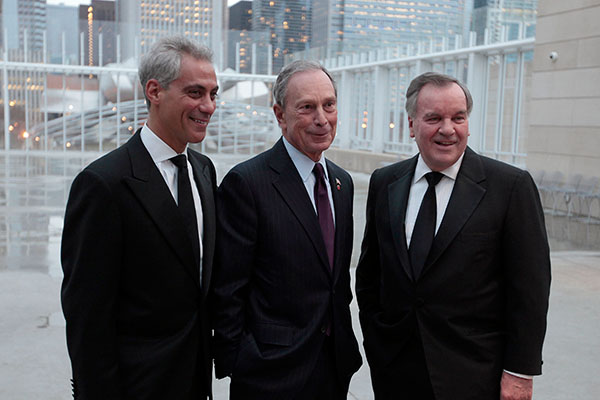
Photo:Terrence Antonio James / Chicago Tribune
Rahm, Bloomberg, and Rich Daley at the Art Institute of Chicago in April 2011.
Three years ago, the news of of Mayor Rich Daley’s retirement after six terms was, for me, one of those “I remember where I was when I heard it” moments.
I was no fan of the father’s and sometimes dismissive of the son, but I had come to see the latter as a rumpled, regular-guy guardian/champion of the city. He was a guy who was born here and would die here, who, like his father, thought being mayor of Chicago was the pinnacle of elective office, not a stepping stone to something grander.
Turns out the flowers and shrubs the younger Daley obsessed over were like a brightly colored bandage over the tumor of a bankrupt budget, lousy privatization deals, deteriorating infrastructure and failing public schools. Still, as someone who has never lived (except for college and grad school) anywhere but Chicago, I thought the city under Rich Daley looked so good and seemed so global in its reach. He was definitely doing a lot of things right.
“Oh, no, what’s next?” I thought on hearing the news. If there were Chicagoans sputtering “Good riddance,” it wasn’t audible beneath the rising swell of regret for the end of an era. The celebrations of Rich Daley and his wife Maggie seemed nonstop in those waning days—I witnessed one over-the-top tribute at the Economic Club in February 2011—until that May when Daley handed over City Hall’s fifth floor to Rahm Emanuel.
In New York, this New Year’s Eve, Mike Bloomberg reluctantly exits his third term after 12 years—10 years short of Daley’s Chicago record, but three terms is the current (Bloomberg-enacted) limit in New York. Undoubtedly Bloomberg tributes will crowd the calendars of well-heeled New Yorkers in the months to come. The guy, after all, is a multi-billionaire ($27 billion and growing), and will have a huge impact on philanthropy, business, media, and public affairs as long as he lives.
But at this juncture, here's what I’m hearing as I spent last week and part of this one in New York: “Can’t wait to see Bloomberg go.” “Goodbye already.” “Enough is enough.”
In Chicago, the Daleys didn’t publicly endorse Rich’s successor, but anyone who followed politics knew that the family was, in thought and clandestine action, pushing for Rahm. Bill Daley, a long-time close friend of Rahm’s who succeeded him as President Obama’s Chief of Staff, could even have cut a deal with Rahm that Bill follows Rahm in the White House and then Rahm follows Rich on the 5th floor.
In New York, City Council Speaker Christine Quinn—who had shoved through for her patron Bloomberg the controversial and increasingly resented third term—was supposed to be Bloomberg’s successor. Conventional wisdom had it that she would prevail at the September 10 primary, or, at worst, score high enough to win a place in the runoff on October 1. Quinn was cast as the Rahm Emanuel of New York’s upcoming primary election—the unspoken Bloomberg choice as Rahm was the unspoken Daley choice. But Bloomberg has still not endorsed her. Instead, he flirted with recruiting other candidates, such as Hillary Clinton, whom he saw as of his own caliber and international renown.
While Quinn is sinking, polls show New Yorkers have fallen in love with the anti-Bloomberg candidate, Bill de Blasio, currently New York’s public advocate. An unabashed leftie from Brooklyn, de Blasio is running on the stunningly effective “Tale of Two Cities” theme—a city of Park Avenue co-ops and Upper East Side brownstones of “nannies and housekeepers,” for Bloomberg and his pals, and a city of miserable schools, closing hospitals, stop-and-frisk policing for the rest. Bill de Blasio supporters market him as a Robin Hood hero, and his new campaign ad script reads: “Bill de Blasio will do what the others won’t. Tax the wealthy to fund pre-K and after-school … Instead of luxury condos, require affordable housing.” Mr. de Blasio puts it: “We believe in everyone having a shot. We have to change this city.”.
In Chicago in 2011, the anti-Rich Daley, anti-Rahm candidate was Miguel del Valle. (Who?) He came in third, only slightly ahead of Carol Moseley Braun, in the first round that gave Rahm the Mayor’s chair. Miguel del Valle raised only $250,000, running on the de Blasio-like theme that Chicago could not be a “world-class city” until it had “world-class neighborhoods.”
My hunch is that master strategist Emanuel will make a run for a much-higher office as soon as he sees an opening. My hunch is also that his departure from the Mayor’s office will little resemble Rich Daley’s. Rahm will be greeted, I predict, with the Chicago version of the Bronx cheer currently aimed at Bloomberg. For Mike Bloomberg, of indeterminate party, there is some career capping job on the horizon—treasury secretary, World Bank president, Vice President, owner of the New York Times. For Rich Daley, there was a disappearing act, followed by his working mayoral and family contacts to make the money he didn’t make as mayor.
It’ll be interesting to see if the inevitable failures of the next New York mayor will engender nostalgia and regrets at Bloomberg’s exit. Will New Yorkers end up wishing that the ever-efficient and strong-willed Bloomberg were back in charge? Funny how infrequently these days one hears any regrets over Rich Daley’s absence.


